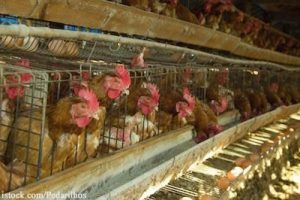California has just passed a law setting the strictest standards for antibiotic use in farm animals in the country. Senate Bill 27, which was enrolled September 26, 2015, prohibits the administration of “medically important antimicrobial drugs, as defined, to livestock unless ordered by a licensed veterinarian through a prescription or veterinary feed directive.” The bill prohibits using antibiotics solely for purposes of gaining weight or improving feed efficiency.
 The governor’s signing statement states “SB 27 addresses an urgent public health program. The science is clear that the overuse of antibiotics in livestock has contributed to the spread of antibiotic resistance and the undermining of decades of life-saving advances in medicine.”
The governor’s signing statement states “SB 27 addresses an urgent public health program. The science is clear that the overuse of antibiotics in livestock has contributed to the spread of antibiotic resistance and the undermining of decades of life-saving advances in medicine.”
The FDA set voluntary standards last year for removing growth promotion claims from antibiotic labels, but that guidance document is not a law. The California bill doesn’t allow the use of antibiotics for disease prevention purposes, which food safety experts claim can increase the risk of antibiotic-resistant bacteria.
The law will take effect on January 1, 2018. It also requires California officials to start a monitoring program to gather information on medically important antibiotic drug sales and usage, data on antibiotic-resistant bacteria, and livestock management data that does not duplicate NARMS, the National Antimicrobial Resistance Monitoring System.
The California Department of Food and Agriculture will report to the legislature by January 1, 2019 the results of outreach activities and monitoring efforts. The department will then advise the legislature about whether or not they have received statistically relevant data.
Anyone who violates this law will be fined not more than $250 a day for each day a violation occurred. In the second and subsequent violations, the fine will increase to $500 a day. The violator will also be required to attend an educational program on the “judicious use of medically important antimicrobial drugs” approved by the government.
The Natural Resources Defense Council states that 80% of all antibiotics sold in this country are used on livestock and poultry. Giving antibiotics to animals that are not sick kills off weak bacteria and lets stronger bacteria build up resistance to the drug. Drug-resistant bacteria are then in the animals on the farm, and when those animals are slaughtered, the bacteria ends up on the meat.
Center for Food Safety praised the California bill, stating that the US CDC has identified antibiotic resistance as “one of the top health threats facing the nation, putting the effectiveness of essential medicines at risk.” Rebecca Spector, West Coast Director of the Center for Food Safety said in a statement, “while there is much more to do to address the public health crisis of antibiotic resistance, and to reduce food safety and animal welfare impacts associated with industrial animal production, SB 27 steps in where the federal government has failed to act. With SB 27, California will once again be a leader for the rest of the nation by taking these efforts to reduce the issue and overuse of antibiotics in livestock.”
Last year’s huge Salmonella outbreak linked to Foster Farms chicken was caused by antibiotic-resistant bacteria. Because of that, 38% of those sickened were hospitalized, compared to the standard 20% hospitalization rate for most Salmonella outbreaks.




